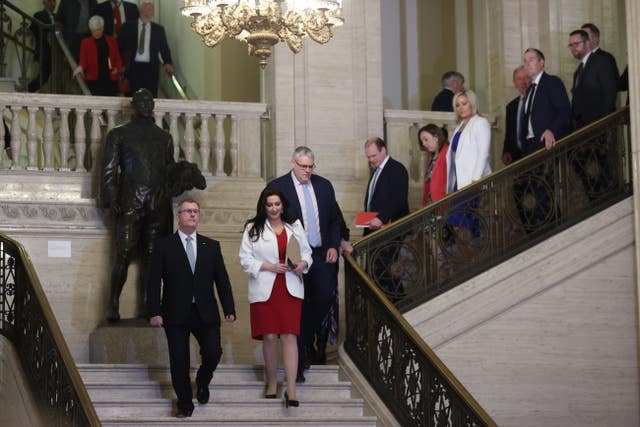Business resumes at Northern Ireland Assembly on historic restoration day
Business at the Northern Ireland Assembly has reconvened on a day when Sinn Fein’s Michelle O’Neill is set to become the first nationalist first minister following a two-year political collapse.
MLAs took their seats in the Assembly chamber at Parliament Buildings, Stormont, on Saturday for a sitting where ministers will be appointed to a powersharing executive, bringing an end to the impasse.
The early proceedings focused on the process of nominating a speaker, with former DUP leader Edwin Poots elected to the role.

Ahead of the sitting, Ms O’Neill pledged to be a first minister for all.
“This is a historic day,” she posted on X.
“It is about the future. It is about working together to deliver for workers and families, and creating new and exciting opportunities that ensure our children and grandchildren can achieve their dreams and ambitions in life.
“As a first minister for all, I am determined to lead positive change for everyone, and to work together with others to progress our society in a spirit of respect, co-operation, and equality.”
This is a day of historic change.
I am determined to deliver for everyone as a First Minister for all. pic.twitter.com/VmqCYbROuT
— Michelle O’Neill (@moneillsf) February 3, 2024
The DUP, the largest unionist party in the region, has agreed to the recall of the political institutions on the back of its deal with the Westminster Government, which party leader Sir Jeffrey Donaldson says has effectively removed the so-called Irish Sea trading border.
On Thursday, two pieces of legislation contained in the agreement were fast-tracked through the House of Commons, opening the way for the Assembly to return.
Sir Jeffrey, who is an MP and does not have a seat in the Assembly, spoke to reporters ahead of the reconvened sitting.
He said it had been a “challenging journey” to the restoration of the Assembly and Executive over the last two years.
“I believe that my party has delivered what many said we couldn’t,” he said.

“We have brought about change that many said was not possible, and I believe that today is a good day for Northern Ireland, a day when once again our place in the United Kingdom and its internal market is respected and protected in our law and restored for all our people to enjoy the benefits of our membership of the union,” he told media in the Great Hall.
“It’s a day when we come together and we take on the responsibility of providing good government for the people of Northern Ireland, for addressing the many issues that confront us at this time.
“My party is determined to play its part working with others to make Northern Ireland work, to make this place the best that it can be, to realise our potential to invest in our people, to ensure that our public services have the resources that they need to provide the best health care, a great education system, prosperity in our economy, housing and jobs for all.”
While Ms O’Neill will take the first minister role due to Sinn Fein winning the most seats in the 2022 election, the DUP has not said who it will nominate for deputy first minister, although there is expectation Emma Little-Pengelly will get the role.
A series of ministerial positions across Stormont departments will then be filled, using the D’Hondt mechanism based on party strengths.

Key among the priorities for new ministers will be dealing with the budget crisis affecting public services across Northern Ireland.
The Government has offered a £3.3 billion package to secure the region’s finances when the Assembly returns, including £600 million to settle public sector pay claims.
However, Sir Jeffrey has indicated that the parties would be working together to secure more money from the Treasury.
While the DUP leader has secured the backing of a majority of party colleagues to accept the deal, some within the Democratic Unionists remain deeply sceptical of the agreement to restore powersharing.
Sir Jeffery is also facing opposition from elements of unionism outside his party.

Traditional Unionist Voice Jim Allister used a speaking contribution linked to the nomination of the speaker to denounce the DUP’s return to powersharing.
He criticised a “DUP climbdown” and claimed that “not one word” of the post-Brexit Northern Ireland Protocol has changed, and that the region remains under EU customs rules, and “ruled in a significant part by foreign laws”.
Mr Allister also claimed that “many” on the DUP benches are unhappy with the party’s course of action.
Sir Jeffrey’s deal with the Government commits to replacing the Windsor Framework’s green lane process at Northern Ireland ports, which requires percentages of goods to be checked as they arrive from Great Britain, with a “UK internal market system” that will govern the movement of goods that remain within the United Kingdom.
Checks would still be carried out but on a risk-based/intelligence-led model to combat illegality and disease, rather than routine stops of disembarking lorries.
Businesses using the internal market system would also need to be signed up to a trusted trader scheme.


